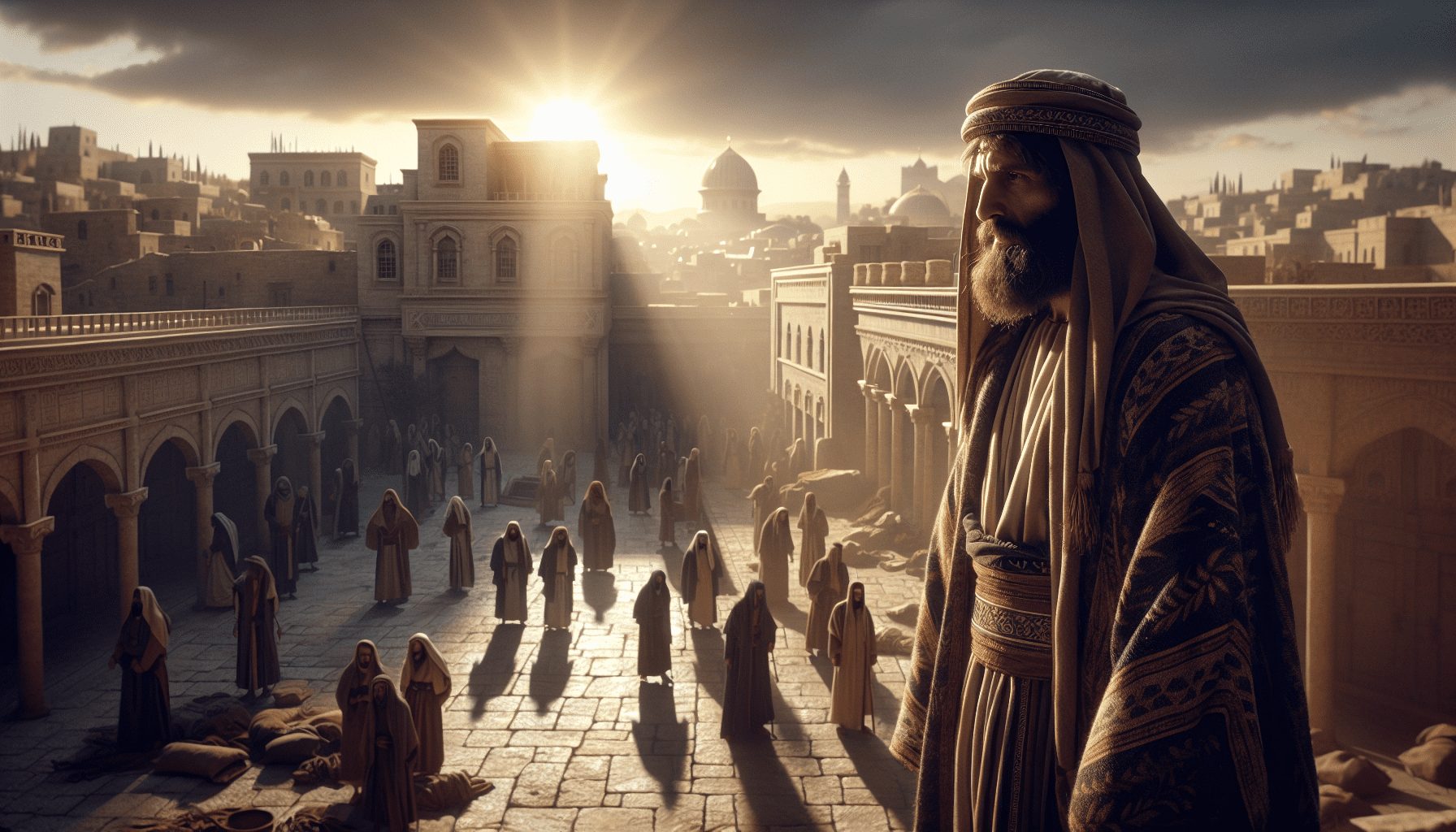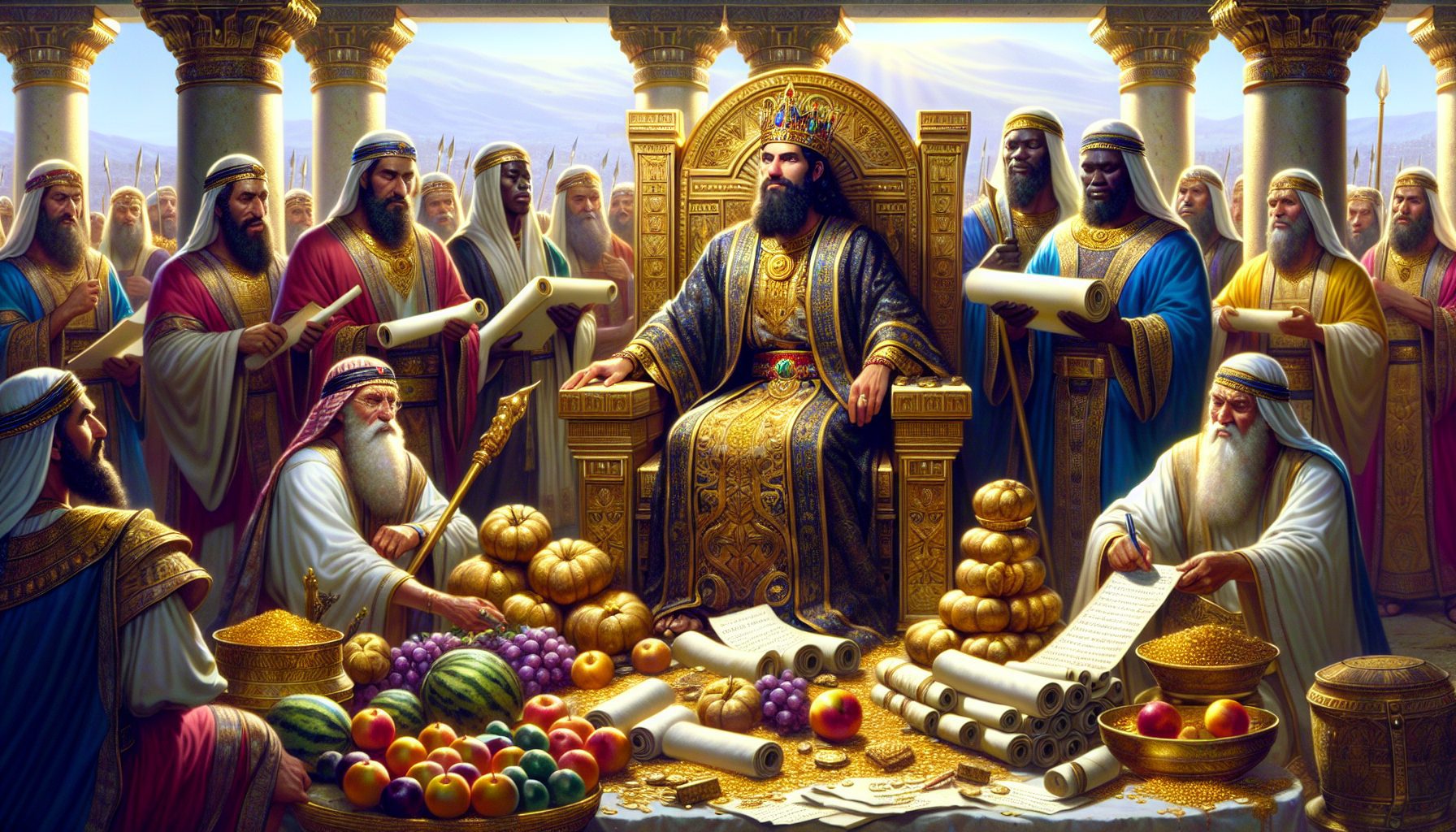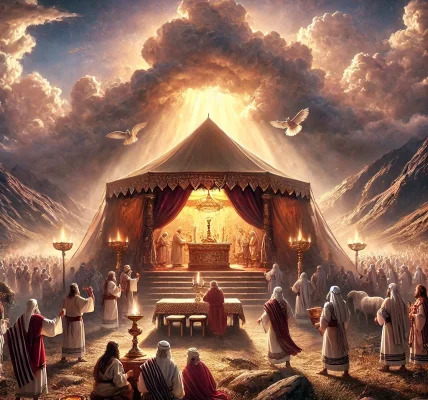**The Great Repentance: A Story of Renewal and Restoration**
The sun hung low in the sky, casting long shadows over the city of Jerusalem. The air was thick with tension, a palpable sense of urgency that gripped the hearts of the people. Ezra, the scribe and priest, stood in the courtyard of the Temple, his face etched with sorrow and determination. The weight of the people’s sin pressed heavily upon him, and he knew that the time for action had come.
It had been a day like any other when Ezra first learned of the transgression. Men from the tribes of Judah and Benjamin had come to him, their faces pale and their voices trembling. “The people of Israel, including the priests and the Levites, have not separated themselves from the peoples of the lands with their abominations,” they confessed. “They have taken foreign wives, mingling the holy seed with the peoples around them. Indeed, the leaders and officials have been at the forefront of this unfaithfulness.”
Ezra’s heart sank. He tore his robe and cloak, a sign of deep mourning, and pulled hair from his head and beard. He sat in stunned silence until the evening sacrifice, his soul burdened with the gravity of their sin. Then, as the sun dipped below the horizon, he fell to his knees, his hands lifted toward heaven. “O Lord, God of Israel, You are righteous,” he prayed, his voice breaking. “We are left this day as a remnant. Here we are before You in our guilt, though because of it not one of us can stand in Your presence.”
The people gathered around him, their faces streaked with tears. They, too, felt the sting of conviction. Among them was Shecaniah, the son of Jehiel, who stepped forward with a bold proposal. “We have been unfaithful to our God by marrying foreign women from the peoples around us,” he admitted. “But even now, there is hope for Israel. Let us make a covenant before our God to send away all these women and their children, according to the counsel of my lord and of those who tremble at the command of our God. Let it be done according to the Law.”
Ezra rose to his feet, his resolve strengthened. He called for an assembly of all the exiles in Jerusalem. A proclamation was issued throughout Judah and Jerusalem: within three days, every man, woman, and child was to gather in the city. Those who failed to appear would forfeit their property and be excluded from the assembly of the exiles.
On the appointed day, the people came from every corner of the land. The courtyard of the Temple was filled to overflowing, a sea of faces marked by fear and repentance. The weather mirrored the mood of the gathering—dark clouds loomed overhead, and a cold wind swept through the crowd. Ezra stood before them, his voice carrying the authority of one who spoke for God. “You have been unfaithful,” he declared. “You have married foreign women, adding to the guilt of Israel. Now, therefore, make confession to the Lord, the God of your fathers, and do His will. Separate yourselves from the peoples of the land and from the foreign wives.”
The people responded with a mixture of sorrow and resolve. “You are right,” they cried. “We must do as you have said.” But the task was immense, and the rain began to fall in torrents, drenching the crowd. “The rain is heavy, and we cannot stand out here,” they pleaded. “This matter cannot be resolved in a day or two, for we have sinned greatly in this thing. Let our officials act on behalf of the whole assembly. Let all in our towns who have married foreign women come at appointed times, accompanied by the elders and judges of each town, until the fierce wrath of our God over this matter is turned away from us.”
Ezra agreed to their proposal. He appointed leaders to oversee the process, and the people returned to their towns. Over the following weeks, the work of repentance began. Men came forward, one by one, confessing their sin and pledging to send away their foreign wives and children. The process was painful, for it meant severing ties with those they had loved. Yet they understood the gravity of their sin and the necessity of obedience to God’s Law.
Among those who confessed was Jonathan, a Levite who had married a woman from Ammon. He stood before the assembly, his voice trembling as he recounted his story. “I thought I was doing no wrong,” he said. “But now I see that I have defiled the holy seed and brought guilt upon myself and my family. I will send her away, though it breaks my heart.” The crowd wept with him, their tears mingling with the rain that continued to fall.
The process continued for months, as each case was carefully examined and resolved. The people worked diligently, driven by a desire to restore their relationship with God. When the work was finally complete, Ezra stood once more before the assembly. “You have done well,” he said, his voice filled with both sorrow and hope. “You have turned away from your sin and sought the Lord’s forgiveness. Now, let us renew our covenant with Him, pledging to walk in His ways and keep His commandments.”
The people responded with a resounding “Amen!” They offered sacrifices of atonement and thanksgiving, their hearts lifted by the promise of God’s mercy. Though the road ahead would not be easy, they knew that they had taken the first step toward renewal and restoration.
As the sun broke through the clouds, casting a golden light over the Temple, Ezra lifted his hands in blessing. “May the Lord, the God of our fathers, be with you,” he prayed. “May He strengthen your hearts and guide your steps as you seek to honor Him in all that you do.”
And with that, the people returned to their homes, their hearts lighter and their spirits renewed. They had faced their sin, confessed it, and turned away from it. And in doing so, they had taken hold of the hope that only God can provide—the hope of forgiveness, restoration, and a future filled with His blessing.




